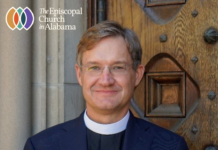The angels said to the shepherds, “To you is born this day … a Savior.” And once the angels had gone, the shepherds headed into Bethlehem to see for themselves.
What they found there was an exhausted young mother. A vigilant new father. And a baby. A baby lying in a feed trough. Surrounded by animals and hay and dirt and dung.
But it wasn’t just any baby. When they looked at him they knew in their gut, in their heart, in their marrow that they were seeing God in the flesh. And that this baby, in this place, born to these poor parents, was telling them everything they needed to know about God. About how God is saving them. Saving you and me and the whole world.
In the infant Jesus we see—like those shepherds saw long ago—that God can and will show up anywhere. At anytime. There are no circumstances so appalling, no dwelling so mean, no life so shattered that God will not make it his very own home.
In Jesus we see that God pursues us wherever we may be. Not to spy on us or to scold us or to judge us but to take up nurturing, healing, liberating residence in the very midst of our lives. No matter how messy our life might be. Frederick Buechner put it like this:
“If holiness and the awful power and majesty of God were present in this least auspicious of all events, this birth of a peasant’s child, then there is no place or time so lowly and earthbound but that holiness can be present there too.”
If you’re like me, the birth of Jesus offers relief and kindles a hope that I could never conjure up for myself. That hope is more than wishful thinking. More than the anticipation that my own desires will be fulfilled or my private agenda will get a divine thumbs up.
The birth of Jesus—the moment in which God takes on the vulnerability and fragility of human flesh in a dangerous town in some stranger’s crummy spare room— shows me that God is with us. That love inhabits even the darkest corners of this world.
And the divine love is no mere feeling. Love is the power that changes everything. As Howard Thurman says, Christmas assures us that “love is sturdier than hate, that right is more confident than wrong, that good is more permanent than evil.”
Jesus will not force his way into our lives. His love is freely given. And we can freely accept it, reject it, or ignore it. Each of us will decide whether or not to make room for Mary and Joseph in the inn of our lives.
As preachers have said in Christmases past, each of us is an innkeeper. Jesus invites us to make a place for him at the center of our lives. And there is a part of us—a tender, wounded, weary, harried, bewildered part of us—that struggles to turn off our “No Vacancy” sign.
In the words of Henri Nouwen:
“A part of us clings to our aloneness and does not allow God to touch us where we are most in pain. Often we hide from him precisely those places in ourselves where we feel guilty, ashamed, confused, and lost. Thus we do not give him a chance to be with us where we feel most alone.”
To put that another way, we struggle to give Jesus a place in our inn because we fear that our rooms will be too shabby, too plain, too messy to meet his approval.
So, I encourage you to look with your imagination at that baby. Not the idealized infant of Renaissance paintings and stained glass windows. But at that peasant baby on a dirt floor in a drab, untidy room. That baby breathing donkey’s breath, smelling of old straw, and wrapped in a tattered blanket.
If God can show up there, God can show up anywhere. With anybody. With you and with me. Wherever life might take us.
Merry Christmas, dear readers. I am grateful for each and every one of you. Love, peace and joy to you all.



